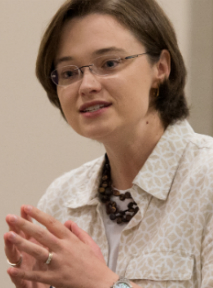Carol Howard Merritt: The Church's New Foundation
The church's best days are still ahead," said Cameron Trimble. I shared a conspiratorial smile, as I often do when with her. She is executive director of the Center for Progressive Renewal, where I am a consultant. She was telling me about Convergence, a network that she is dreaming up with a group of people, including authors Brian McLaren and Diana Butler Bass.
As Trimble talked about Convergence, I imagined her standing in that long pattern of creation which reverberates through our ancient texts. God spoke into the chaos, and the words formed order as they gathered waters, brought forth vegetation, gave rise to animals, and molded humanity. The birth of Jesus Christ, the answer to longing prayers, is described as the Word made flesh.
We see creation in these grand narratives, and we also watch it unfold in our everyday lives. A 13-month-old toddler has not begun to speak, so she stands before the refrigerator, with her arm out and her tiny fist grabbing at air, and grunts. The guttural noises let her parents know that she wants. Eventually her "meh, meh, meh" will become "milk." When her parents deliver the magical liquid, longing becomes word, and word becomes object.
In our ecclesial bodies, as the Spirit moves over the chaos, fear, and passion, our yearnings begin to wear syllables. The utterances begin to organize into movements and structures. One of those structures is Convergence.
|  |
|
| Cameron Trimble. Photo by Angela Jimenez Photography. |
"Convergence is about taking the best of our denominations, seminaries, and heritages and working with one another in new ways that create new possibilities for our future," Trimble said.
"We see a world where a United Methodist firmly rooted in Methodism is working collaboratively with a Pentecostal to start a new ministry to address poverty in their neighborhood. We see Roman Catholics partnering with the United Church of Christ to address climate change. Convergence is a call to action for the Christian church to proclaim a generous Christianity that welcomes all people as children of God, reconciling us one to the other and to our earth."
Many of us stand like grunting toddlers, knowing that the church will look different in the coming years. We see generational shifts as the median age of our congregations becomes closely aligned with the retirement age. We notice geographical movement as younger generations move to urban areas for education and jobs, diminishing the size of rural congregations. We respond by planting new congregations with the assets of closing congregations. We have engaged in conversations, articulating what we want to see happen.
Throughout this process, we're pumping our fists, longing for something, but we're not sure what it will look like.
Convergence is working to bring people and resources together in order to move the chaos and conversation into structure. Supporters of Convergence have a few goals that have to do with media, social justice, and leadership formation. They hope to lift up the profiles of churches, organizations, and individuals who work for the common good. They want to take action on social initiatives. They plan to train leaders who can create new organizations and renew existing ones. They intend to develop a campus ministry network. And in order to do these things, they need to maintain channels of communication and support.
Like the body of Christ, each person has a different function. Writers like Brian McLaren put longing into words. Organizers like Trimble understand how to build institutional structure. Innovators like Episcopal priest Stephanie Spellers understand the big picture and can reflect theologically on this creation.
"My hope is that we will look back at this moment in the life of the church many years from now and know that because we found new ways of collaborating to address the challenges of our age, we built a foundation that ensured the church's best days are still ahead," said Trimble. "The collective human and environmental challenges of this moment are larger than any church or denomination alone can address. We, finally, need each other and are ready to work across denominational lines to find new possibilities for our shared future."
